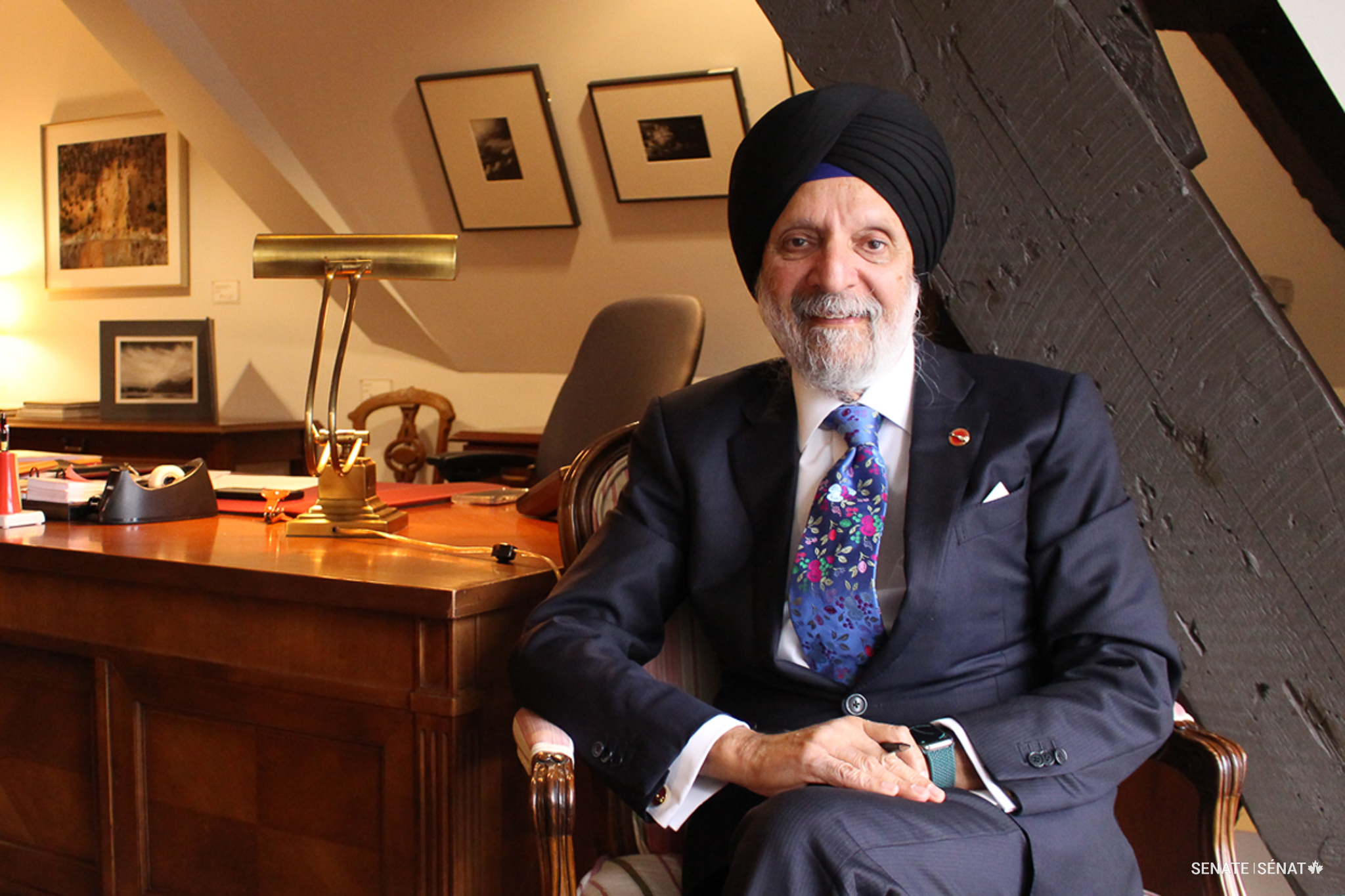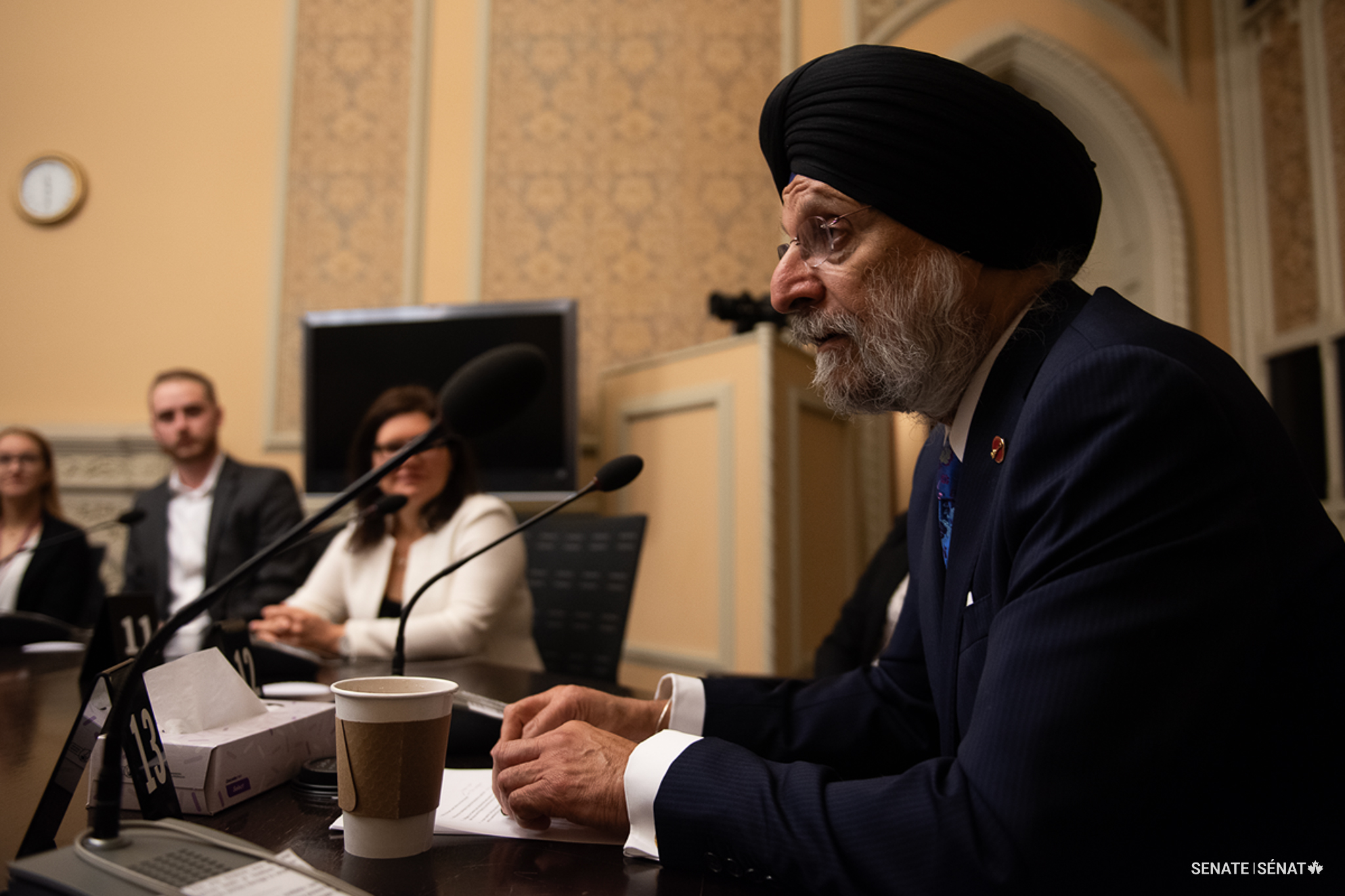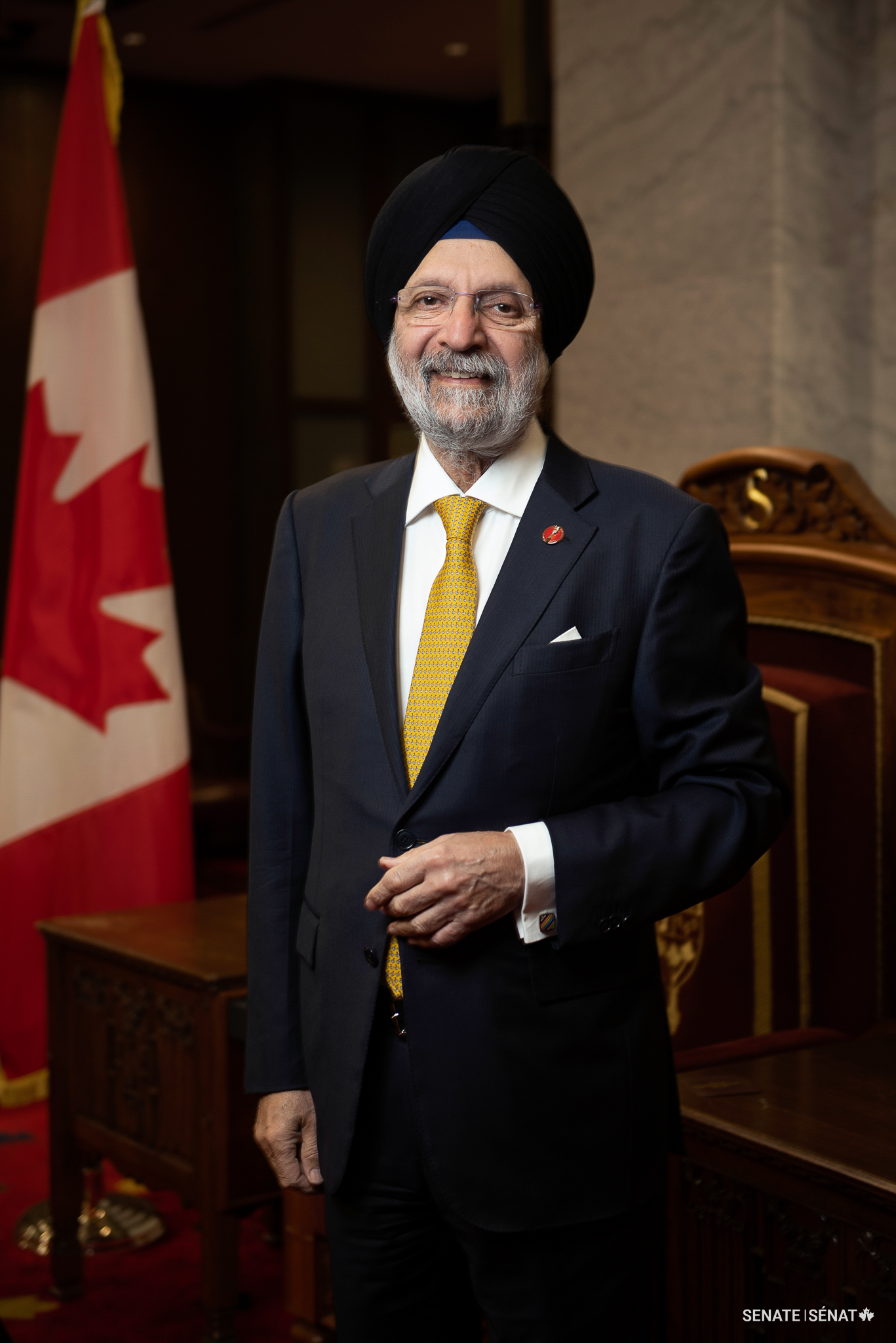“An honour to serve”: Former senator Marwah reflects on his Senate career

After coming to Canada in the late 1970s with little more than a backpack, the Honourable Sabi Marwah eventually joined Scotiabank, where he spent decades climbing the ranks to become an influential senior executive.
He developed a reputation for his keen analytical mind and affinity for numbers, which would later serve him as chair of the Standing Committee on Internal Economy, Budgets and Administration (CIBA).
Mr. Marwah took an early retirement from the Red Chamber on September 8, 2023. After his departure, he sat down with SenCAplus to share his reflections on the Senate.
You were born and raised in India, and then you moved to Los Angeles as a young adult. How did you end up in Canada?
I was very fortunate to have parents who gave me the gift that keeps on giving — education. I did my master’s degree in India, and then I obtained an MBA from the University of California in Los Angeles. After I graduated, I travelled extensively across the U.S. until I finally ran out of money. My brother was here, and he had sponsored me, so I thought I would give Canada a try.
I showed up here with a backpack and joined the ranks of the unemployed. I always thought that I might go back to the U.S. or India, but Canada was very good to me — and I never left.
 Senator Sabi Marwah meets with members of the Senate’s Communications Directorate in his capacity as chair of the Standing Committee on Internal Economy, Budgets and Administration in East Block in 2019.
Senator Sabi Marwah meets with members of the Senate’s Communications Directorate in his capacity as chair of the Standing Committee on Internal Economy, Budgets and Administration in East Block in 2019.
How does one go from having a backpack and not much else, to becoming the Vice Chairman and Chief Operating Officer of Scotiabank?
I came to Canada in the middle of a recession, so it was difficult to find a job at first. I knew I wanted to work in financial services because I was very good with numbers, and I had an analytical mind. I got a job with Manulife as an IT programmer, but it was not ideal for my skills. I wanted to be a trader, but in 1979 it was difficult for somebody like me to join a trading floor. Hence, I joined the Finance Department at Scotiabank and ended up staying in finance for virtually my whole career.
I eventually became Scotiabank’s Chief Financial Officer. I then gradually assumed responsibility for more departments — including IT, shared services, real estate, investments, economics, among others — and eventually was appointed Chief Operating Officer.
It is interesting that I travelled the world before I came to Canada, but when I joined the bank, I remained in the building at the corner of King and Bay streets for my entire career.
 Senator Marwah stands in front of the Speaker’s chair in the Senate Chamber.
Senator Marwah stands in front of the Speaker’s chair in the Senate Chamber.
How did you come to be a senator?
It was always my desire to do public service. I was grateful for what Canada had given me, and I wanted to give back in some way. Upon my retirement, I spoke to many in the political world, both federally and provincially, and one of the individuals was Michael Wilson, a former federal minister of finance. It was he who first suggested that the Senate was something I should consider — and the rest is history.
What did it mean for you to become the first Sikh senator in Canada?
That was never my motivation for joining the Senate, but it was the reality. As a result, I felt that I had to serve with an even higher standard of professionalism and integrity.
As the first Sikh senator, I was very proud to sponsor Bill C-376, which designates every April as Sikh Heritage Month. That was very important for the community and for me personally. I was pleased that it received unanimous support, both at the committee stage and in the Senate Chamber.
One of your first orders of business as senator was to advocate for the establishment of the Canadian Infrastructure Bank (CIB). Why was this issue important to you?
At the time, Canada had a $500-billion infrastructure deficit because many infrastructure projects — including roads, hospitals and bridges — were neglected in the 1980s and 1990s. Governments did not have the funds to deal with this deficit, so it was a question of getting the private sector involved in these long-term, expensive projects. Canada is a leader in public private partnerships, also known as P3. The CIB was the next evolution of a P3 system because it provided a more formal, standard structure in which P3 partnerships could flourish.
 From left, Senators Sabi Marwah, Nancy J. Hartling, Marc Gold and Gwen Boniface participate in the Rolling Rampage on the Hill event in 2017.
From left, Senators Sabi Marwah, Nancy J. Hartling, Marc Gold and Gwen Boniface participate in the Rolling Rampage on the Hill event in 2017.
You chaired CIBA — the committee in charge of the internal management of the Senate — for four years. What committee work stands out to you?
The management of the COVID-19 pandemic certainly stands out. There was no precedent on something like this. Plus, things were evolving exceedingly quickly, and there was limited information. We had to set up new protocols, new procedures and then execute them in a short period of time.
We also had to figure out how to run the Senate virtually, so that senators could participate in sittings and committee meetings remotely. There were a lot of challenges ranging from technology to human resource issues, as well as managing translation services. We had to manage a large number of emerging issues and build a system that could run efficiently, effectively and on budget.
Overall, I consider the management of the pandemic as one of the achievements of CIBA, and of former Senate speaker George J. Furey.
You had a few years left until your mandatory retirement age. What made you decide to retire early?
I joined the Senate as an act of public service. At that time, I had told myself that I would serve between five and seven years. My resignation from CIBA last year was the beginning of the process. And now, the time had come, and so I officially retired in September 2023.
I feel extremely privileged to have been appointed to the Senate. It has been an honour to serve. I now have more respect for the legislative process because I understand that there are many checks and balances in creating legislation. I learned a lot from listening to committee witnesses and my colleagues in the Senate Chamber. I may not necessarily have agreed with everyone, but hearing their perspectives helped shape my own.
 In his retirement, Senator Marwah is planning to spend more time with his family, including his three grandchildren. (Photo credit: Office of Senator Sabi Marwah)
In his retirement, Senator Marwah is planning to spend more time with his family, including his three grandchildren. (Photo credit: Office of Senator Sabi Marwah)
What are you planning to do next?
I have retired from the Senate, but not from life. I have always viewed life as a journey of learning, and I intend to carry on with that. As a start, I am following my own advice, which is not to make any new commitments for three months and then decide what my new norm is going to be.
And then there is being with the family, travelling and the ultimate gift of all — being able to spend more time with my three grandchildren, aged five, three and one. They are a delight.
The Honourable Sarabjit Marwah retired from the Senate of Canada in September 2023. Visit the Library of Parliament's Parlinfo website to learn more about his work in Parliament.
Related articles
Tags
Committee news
“An honour to serve”: Former senator Marwah reflects on his Senate career

After coming to Canada in the late 1970s with little more than a backpack, the Honourable Sabi Marwah eventually joined Scotiabank, where he spent decades climbing the ranks to become an influential senior executive.
He developed a reputation for his keen analytical mind and affinity for numbers, which would later serve him as chair of the Standing Committee on Internal Economy, Budgets and Administration (CIBA).
Mr. Marwah took an early retirement from the Red Chamber on September 8, 2023. After his departure, he sat down with SenCAplus to share his reflections on the Senate.
You were born and raised in India, and then you moved to Los Angeles as a young adult. How did you end up in Canada?
I was very fortunate to have parents who gave me the gift that keeps on giving — education. I did my master’s degree in India, and then I obtained an MBA from the University of California in Los Angeles. After I graduated, I travelled extensively across the U.S. until I finally ran out of money. My brother was here, and he had sponsored me, so I thought I would give Canada a try.
I showed up here with a backpack and joined the ranks of the unemployed. I always thought that I might go back to the U.S. or India, but Canada was very good to me — and I never left.
 Senator Sabi Marwah meets with members of the Senate’s Communications Directorate in his capacity as chair of the Standing Committee on Internal Economy, Budgets and Administration in East Block in 2019.
Senator Sabi Marwah meets with members of the Senate’s Communications Directorate in his capacity as chair of the Standing Committee on Internal Economy, Budgets and Administration in East Block in 2019.
How does one go from having a backpack and not much else, to becoming the Vice Chairman and Chief Operating Officer of Scotiabank?
I came to Canada in the middle of a recession, so it was difficult to find a job at first. I knew I wanted to work in financial services because I was very good with numbers, and I had an analytical mind. I got a job with Manulife as an IT programmer, but it was not ideal for my skills. I wanted to be a trader, but in 1979 it was difficult for somebody like me to join a trading floor. Hence, I joined the Finance Department at Scotiabank and ended up staying in finance for virtually my whole career.
I eventually became Scotiabank’s Chief Financial Officer. I then gradually assumed responsibility for more departments — including IT, shared services, real estate, investments, economics, among others — and eventually was appointed Chief Operating Officer.
It is interesting that I travelled the world before I came to Canada, but when I joined the bank, I remained in the building at the corner of King and Bay streets for my entire career.
 Senator Marwah stands in front of the Speaker’s chair in the Senate Chamber.
Senator Marwah stands in front of the Speaker’s chair in the Senate Chamber.
How did you come to be a senator?
It was always my desire to do public service. I was grateful for what Canada had given me, and I wanted to give back in some way. Upon my retirement, I spoke to many in the political world, both federally and provincially, and one of the individuals was Michael Wilson, a former federal minister of finance. It was he who first suggested that the Senate was something I should consider — and the rest is history.
What did it mean for you to become the first Sikh senator in Canada?
That was never my motivation for joining the Senate, but it was the reality. As a result, I felt that I had to serve with an even higher standard of professionalism and integrity.
As the first Sikh senator, I was very proud to sponsor Bill C-376, which designates every April as Sikh Heritage Month. That was very important for the community and for me personally. I was pleased that it received unanimous support, both at the committee stage and in the Senate Chamber.
One of your first orders of business as senator was to advocate for the establishment of the Canadian Infrastructure Bank (CIB). Why was this issue important to you?
At the time, Canada had a $500-billion infrastructure deficit because many infrastructure projects — including roads, hospitals and bridges — were neglected in the 1980s and 1990s. Governments did not have the funds to deal with this deficit, so it was a question of getting the private sector involved in these long-term, expensive projects. Canada is a leader in public private partnerships, also known as P3. The CIB was the next evolution of a P3 system because it provided a more formal, standard structure in which P3 partnerships could flourish.
 From left, Senators Sabi Marwah, Nancy J. Hartling, Marc Gold and Gwen Boniface participate in the Rolling Rampage on the Hill event in 2017.
From left, Senators Sabi Marwah, Nancy J. Hartling, Marc Gold and Gwen Boniface participate in the Rolling Rampage on the Hill event in 2017.
You chaired CIBA — the committee in charge of the internal management of the Senate — for four years. What committee work stands out to you?
The management of the COVID-19 pandemic certainly stands out. There was no precedent on something like this. Plus, things were evolving exceedingly quickly, and there was limited information. We had to set up new protocols, new procedures and then execute them in a short period of time.
We also had to figure out how to run the Senate virtually, so that senators could participate in sittings and committee meetings remotely. There were a lot of challenges ranging from technology to human resource issues, as well as managing translation services. We had to manage a large number of emerging issues and build a system that could run efficiently, effectively and on budget.
Overall, I consider the management of the pandemic as one of the achievements of CIBA, and of former Senate speaker George J. Furey.
You had a few years left until your mandatory retirement age. What made you decide to retire early?
I joined the Senate as an act of public service. At that time, I had told myself that I would serve between five and seven years. My resignation from CIBA last year was the beginning of the process. And now, the time had come, and so I officially retired in September 2023.
I feel extremely privileged to have been appointed to the Senate. It has been an honour to serve. I now have more respect for the legislative process because I understand that there are many checks and balances in creating legislation. I learned a lot from listening to committee witnesses and my colleagues in the Senate Chamber. I may not necessarily have agreed with everyone, but hearing their perspectives helped shape my own.
 In his retirement, Senator Marwah is planning to spend more time with his family, including his three grandchildren. (Photo credit: Office of Senator Sabi Marwah)
In his retirement, Senator Marwah is planning to spend more time with his family, including his three grandchildren. (Photo credit: Office of Senator Sabi Marwah)
What are you planning to do next?
I have retired from the Senate, but not from life. I have always viewed life as a journey of learning, and I intend to carry on with that. As a start, I am following my own advice, which is not to make any new commitments for three months and then decide what my new norm is going to be.
And then there is being with the family, travelling and the ultimate gift of all — being able to spend more time with my three grandchildren, aged five, three and one. They are a delight.
The Honourable Sarabjit Marwah retired from the Senate of Canada in September 2023. Visit the Library of Parliament's Parlinfo website to learn more about his work in Parliament.


